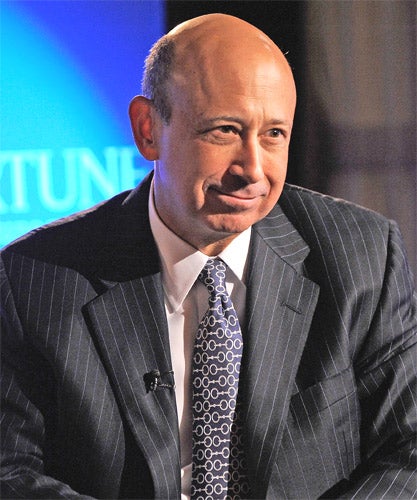Goldman defies public fury with another £10bn bonus payout

Goldman Sachs, the mightiest of the world's investment banks, will reveal a new round of bumper bonus payouts this morning that is expected to average at around $450,000 (£280,000) per person, demonstrating that another year of public fury at bankers' pay has failed to change behaviour on Wall Street and in the City of London.
The bank is likely to confirm that its latest annual bill for pay, perks and end-of-year bonuses is around £10bn.
Politicians on both sides of the Atlantic have watched impotently as banks continue to pay out giant bonuses, in some cases returning close to the levels seen before the market meltdown of 2008 and the government bailouts that kept the financial system running.
At Goldman, the peak year for bonuses was in 2007, when the average pay for its global workforce reached $661,490. Now, despite extensive Wall Street reform designed to restrain the excesses that led to the credit crisis, Goldman and others are again posting near-record profits, and handing staff a large slice of the proceeds.
The announcement of Goldman's annual figures for 2010 will be the centrepiece of the earnings season, and the most important measure of the health of the financial sector, because the bank dominates trading and has become a lightning rod for public and political concern over Wall Street practices.
Last year, in a move aimed at heading off some criticism, it unexpectedly pulled money out of the bonus pool for staff in the final months of the year, keeping average bonuses below the psychologically important level of $500,000 (£313,000). No one is expecting a similar gesture this year, as competition for staff has hotted up on Wall Street.
After the first nine months of 2010, Goldman had put £8.2bn aside for pay and bonuses. Analysts are expecting the final amount to come in only modestly below the previous year's total of £10bn. Goldman bankers, on average, earn more than 10 times the national average income in either the UK or the US. The continuing high level of bonuses comes despite recent declines in trading activity on Wall Street, which has meant that few banks are expected to post record results.
Goldman has had to fight to repair the damage done to its reputation by political attacks, public anger over bonuses, and fraud charges that were laid against it last year relating to its conduct in the mortgage market before the credit crisis.
To the wider public, the bank has become viewed as "a giant vampire squid, wrapped round the face of humanity, relentlessly jamming its blood funnel into anything that smells like money" – in the memorable phrase of the Rolling Stone magazine journalist Matt Taibbi. And on Wall Street, the company's clients have begun to believe that Goldman cares more about making a short-term profit on its own investments than it does on helping them do business, according to the results of secret research commissioned by the bank.
Last week, Goldman published a 63-page report promising to overhaul its internal procedures and improve ethics. It proposed "increasing emphasis on evaluation criteria relating to reputational risk management in the firm's annual performance review and compensation and other incentive and recognition processes" – in other words, to tie bonuses more clearly to ethical practices.
This morning's results from Goldman, which has promised greater transparency, will also be notable because they will be the first to include specific details about how much money the bank makes from trading its own money, as opposed to working on behalf of clients.
Bank forced to pull $1.5bn Facebook share offer
Goldman Sachs has had to exclude US-based investors from a special $1.5bn (£930m) investment opportunity in Facebook.
It was reported earlier this month that the bank was looking to raise $1.5bn for Facebook through an exclusive share offer, known as a private placement, for the bank's top clients. In a statement, the investment bank said that "intense media coverage" had prompted its decision to pull the offer from US clients.
The "special purpose vehicle" set up by Goldman Sachs had been seen as a way to circumnavigate rules set out by the United States' Securities and Exchange Commission (SEC) that if a private firm has more than 500 shareholders, it is required to register and file public statements.
The Goldman statement said: "We regret the consequences of this decision, but Goldman Sachs believes this is the most prudent path to take." The move is a blow to Facebook and an embarrassment to Goldman, which had reportedly received orders totalling $7bn for the $1.5bn it was hoping to sell.
Tom Peck
Subscribe to Independent Premium to bookmark this article
Want to bookmark your favourite articles and stories to read or reference later? Start your Independent Premium subscription today.

Join our commenting forum
Join thought-provoking conversations, follow other Independent readers and see their replies